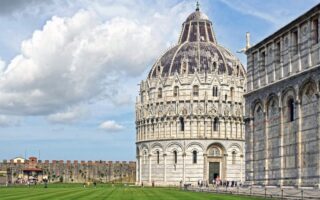Extreme Unction, also known as the Sacrament of the Anointing of the Sick, is a sacrament of the Catholic Church that is administered to those who are seriously ill or in danger of death.
Table of Contents
History of Extreme Unction in the Catholic Church
Have you ever heard of the term “Extreme Unction” in the Catholic Church? If not, you’re not alone. This sacrament, also known as the Anointing of the Sick, has a long history within the Catholic tradition. Let’s take a closer look at the origins and significance of Extreme Unction in the Catholic Church.
The practice of anointing the sick with oil dates back to ancient times, with references to this ritual found in both the Old and New Testaments of the Bible. In the Book of James, it is written, “Is anyone among you sick? Let them call the elders of the church to pray over them and anoint them with oil in the name of the Lord.” This passage is often cited as the basis for the sacrament of Extreme Unction in the Catholic Church.
Throughout history, the sacrament of Extreme Unction has evolved and undergone various changes. In the early centuries of Christianity, it was primarily administered to those who were seriously ill or near death. The anointing was believed to provide spiritual strength and comfort to the individual as they prepared to meet their maker.
During the Middle Ages, the sacrament of Extreme Unction became more formalized within the Catholic Church. It was seen as a way to prepare the soul for death and to cleanse it of sin. The anointing was typically performed by a priest, who would use blessed oil to anoint the forehead and hands of the sick person.
In the 20th century, the sacrament of Extreme Unction underwent a significant transformation. In 1972, the Second Vatican Council introduced changes to the sacrament, including a new emphasis on healing and spiritual strength for the sick, rather than just preparation for death. The sacrament was renamed the Anointing of the Sick to reflect this shift in focus.
Today, the sacrament of the Anointing of the Sick is typically administered to those who are seriously ill, elderly, or facing a major surgery. It is meant to provide spiritual strength, healing, and comfort to the individual, as well as forgiveness of sins. The sacrament can be received multiple times throughout a person’s life, not just in the final moments before death.
In conclusion, the sacrament of Extreme Unction, now known as the Anointing of the Sick, has a long and rich history within the Catholic Church. From its origins in ancient times to its evolution in the modern era, this sacrament has been a source of spiritual strength and comfort for countless individuals. Whether you are facing a serious illness or simply in need of spiritual healing, the Anointing of the Sick is a powerful sacrament that can provide solace and support in times of need.
The Sacrament of Anointing of the Sick
Have you ever heard of the term “Extreme Unction” in the Catholic Church? If not, you’re not alone. This sacrament, also known as the Anointing of the Sick, is one of the seven sacraments of the Catholic Church. It is a ritual that is performed on those who are seriously ill or in danger of death. The sacrament is meant to provide spiritual healing and strength to the individual, as well as forgiveness of sins.
The Anointing of the Sick is a sacrament that has been practiced in the Catholic Church for centuries. It is believed to have been instituted by Jesus himself, as described in the New Testament. In the Letter of James, it is written, “Is anyone among you sick? Let them call the elders of the church to pray over them and anoint them with oil in the name of the Lord.”
The sacrament is typically administered by a priest, who anoints the sick person with blessed oil on their forehead and hands. The priest then prays for the person’s healing and forgiveness of sins. The sacrament is meant to bring comfort and strength to the individual in their time of need, and to prepare them for the journey to eternal life.
The Anointing of the Sick is not just for those who are on their deathbed. It can be administered to anyone who is seriously ill or facing a major surgery. The sacrament is meant to provide spiritual healing and strength to the individual, as well as forgiveness of sins. It is a way for the Church to show its care and concern for those who are suffering.
The sacrament is also a reminder of the importance of caring for the sick and the vulnerable in our society. It is a way for the Church to reach out to those who are in need and to offer them comfort and support in their time of need. It is a way for the Church to show its love and compassion for all of God’s children.
In recent years, there has been a renewed emphasis on the Anointing of the Sick in the Catholic Church. Pope Francis has spoken out about the importance of this sacrament, and has encouraged priests to make it more readily available to those who are in need. The sacrament is seen as a way to bring healing and comfort to those who are suffering, and to remind them of God’s love and mercy.
So, the next time you hear the term “Extreme Unction” or Anointing of the Sick, remember that it is a sacrament of the Catholic Church that is meant to bring healing and comfort to those who are in need. It is a way for the Church to show its care and concern for those who are suffering, and to offer them spiritual strength and forgiveness of sins. It is a reminder of the importance of caring for the sick and the vulnerable in our society, and a way for the Church to show its love and compassion for all of God’s children.
Rituals and Practices of Extreme Unction

Have you ever heard of the term “Extreme Unction” in the Catholic Church? If not, you’re not alone. This sacrament, also known as the Anointing of the Sick, is one of the seven sacraments of the Catholic Church. It is a ritual that is performed on those who are seriously ill or in danger of death. But what exactly does this sacrament entail, and why is it considered so important in the Catholic faith?
The sacrament of Extreme Unction involves the anointing of the sick person with blessed oil by a priest. This anointing is done on the forehead and hands of the individual, and the priest also offers prayers for the person’s healing and spiritual well-being. The sacrament is meant to bring comfort and strength to the sick person, both physically and spiritually, as they face their illness or impending death.
One of the key beliefs behind Extreme Unction is the idea that through this sacrament, the sick person receives the grace of God to help them in their time of need. It is believed that the anointing with oil symbolizes the healing power of Christ, and that through this sacrament, the sick person can experience a sense of peace and spiritual healing. The prayers offered by the priest are also meant to bring comfort and strength to the individual, helping them to face their illness with courage and faith.
The sacrament of Extreme Unction is not only meant to provide spiritual comfort to the sick person, but also to bring about physical healing if it is God’s will. While the sacrament is not a guarantee of physical healing, it is believed to have the power to bring about miraculous healings in some cases. The sacrament is also seen as a way for the sick person to unite their suffering with the suffering of Christ, finding meaning and purpose in their illness through their faith.
In addition to providing comfort and healing to the sick person, the sacrament of Extreme Unction also offers support to their loved ones. The prayers and rituals of the sacrament can bring a sense of peace and hope to family members and friends who are caring for a sick loved one. It can also help them to cope with the emotional and spiritual challenges that come with caring for someone who is seriously ill.
Overall, the sacrament of Extreme Unction is a powerful and meaningful ritual in the Catholic Church. It offers comfort, strength, and healing to those who are sick or in danger of death, and provides a sense of peace and hope to their loved ones. Through the anointing with oil, prayers, and rituals of the sacrament, the sick person can experience the grace of God in a profound and transformative way. So the next time you hear about Extreme Unction, remember the deep significance and importance that this sacrament holds in the Catholic faith.
The Significance of Extreme Unction in Catholic Beliefs
Extreme Unction, also known as the Anointing of the Sick, is a sacrament in the Catholic Church that holds great significance for believers. This sacrament is often misunderstood or overlooked, but it plays a crucial role in the spiritual and physical well-being of individuals facing serious illness or the end of life.
When a person is seriously ill or in danger of death, the sacrament of Extreme Unction can bring comfort and strength to both the individual and their loved ones. It is a ritual of anointing with blessed oil, accompanied by prayers for healing and forgiveness. This sacrament is not only a source of spiritual grace but also a reminder of the presence of God in times of suffering and uncertainty.
The sacrament of Extreme Unction is rooted in the teachings of Jesus Christ, who showed compassion and healing to the sick and suffering during his ministry on earth. In the Gospel of Mark, Jesus instructs his disciples to anoint the sick with oil and pray for their healing. This tradition has been passed down through the centuries in the Catholic Church as a way of continuing Christ’s healing ministry.
The sacrament of Extreme Unction is not only for physical healing but also for the healing of the soul. It is a time for the individual to reflect on their life, seek forgiveness for their sins, and prepare for the journey from this life to the next. The prayers and anointing of the sacrament are meant to bring peace and comfort to the individual as they face the unknown.
In addition to providing spiritual comfort, the sacrament of Extreme Unction also has a practical purpose. The anointing with blessed oil is believed to have a healing effect on the body, offering strength and relief to the sick person. While the sacrament does not guarantee physical healing, it is a way for the individual to place their trust in God’s will and find peace in the midst of suffering.
The sacrament of Extreme Unction is often administered by a priest, who visits the sick person in their home, hospital, or hospice care facility. The priest begins by praying for the individual’s healing and forgiveness, then anoints them with blessed oil on their forehead and hands. The prayers and anointing are meant to bring comfort and strength to the individual as they face their illness or the end of life.
For Catholics, the sacrament of Extreme Unction is a reminder of the importance of faith and trust in God’s plan. It is a time to seek spiritual healing and reconciliation, to find peace in the midst of suffering, and to prepare for the journey from this life to the next. While the sacrament may be difficult to understand or accept, it is a source of grace and comfort for those facing serious illness or the end of life.
In conclusion, the sacrament of Extreme Unction holds great significance in the Catholic Church as a source of spiritual and physical healing for individuals facing serious illness or the end of life. It is a time for reflection, forgiveness, and trust in God’s plan, offering comfort and strength to those in need. While the sacrament may be misunderstood or overlooked, it plays a crucial role in the spiritual well-being of believers and reminds us of the presence of God in times of suffering and uncertainty.
Controversies and Debates Surrounding Extreme Unction
Extreme Unction, also known as the Anointing of the Sick, is a sacrament in the Catholic Church that has been the subject of much controversy and debate over the years. This sacrament is often misunderstood and misinterpreted by those outside of the Catholic faith, leading to confusion and misconceptions about its purpose and significance.
One of the main controversies surrounding Extreme Unction is its association with death. Many people mistakenly believe that this sacrament is only administered to those who are on their deathbed, leading to the misconception that it is a last-minute attempt to secure salvation for the dying. However, this is not the case. Extreme Unction is actually intended for those who are seriously ill or facing a major surgery, in order to provide spiritual strength and healing during their time of need.
Another point of contention surrounding Extreme Unction is its perceived lack of relevance in modern times. Some critics argue that advancements in medical science have made the sacrament obsolete, as modern medicine is able to provide physical healing in ways that were not possible in the past. However, the Catholic Church maintains that the sacrament is still important for providing spiritual healing and comfort to the sick, regardless of the advancements in medical technology.
Despite these controversies, Extreme Unction remains an important sacrament in the Catholic Church, with a rich history and tradition dating back to the early days of Christianity. The sacrament is rooted in the teachings of Jesus Christ, who healed the sick and comforted the afflicted during his ministry on earth. The Anointing of the Sick is seen as a continuation of this healing ministry, providing spiritual strength and grace to those who are suffering.
In addition to its spiritual significance, Extreme Unction also serves as a reminder of the importance of community and support in times of illness. The sacrament is typically administered by a priest, who anoints the sick person with blessed oil and prays for their healing and comfort. This act of anointing is a powerful symbol of the Church’s presence and care for the sick, reminding them that they are not alone in their suffering.
Despite the controversies and debates surrounding Extreme Unction, the sacrament continues to be a source of comfort and strength for many Catholics facing illness or surgery. It is a reminder of the healing power of God’s grace and the importance of faith in times of trial. While the sacrament may be misunderstood by some, its significance and relevance in the Catholic Church remain unchanged.
In conclusion, Extreme Unction is a sacrament in the Catholic Church that has been the subject of controversy and debate over the years. Despite misconceptions and misunderstandings, the sacrament remains an important source of spiritual healing and comfort for the sick. Its roots in the healing ministry of Jesus Christ and its role in providing support and community to those in need make Extreme Unction a valuable and meaningful sacrament in the Catholic tradition.
Conclusion
Extreme Unction, also known as the Anointing of the Sick, is a sacrament in the Catholic Church that is administered to those who are seriously ill or in danger of death. It involves the anointing of the forehead and hands with blessed oil and the prayer for the person’s physical and spiritual healing. The sacrament is meant to bring comfort, strength, and forgiveness to the individual as they prepare to face the end of their earthly life.


